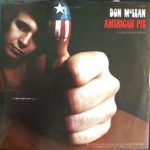“So bye, bye Miss American Pie . . .

Drove my Chevy to the levee but the levee was dry . . .”
If you’re like me, you’ll never forget the lyrics nor the tune to “American Pie” written and sung by the iconic rock musician Don McLean. Versions of his song continue to be played, not just on “oldie” stations but across the radio spectrum. The lyrics are so full, the melody so memorable, that once heard, it is nearly impossible to forget the tune.
Recently, in a YouTube retrospective (here), McLean was asked about music today. His response was stunning:
“The music doesn’t mean anything. The music reflects the spiritual nature of the society. We have a kind of a nihilistic society now. No one believes in anything, no one likes anything, no one has any respect for anything much. The music shows that.” [~minute 22-23]
Now whether or not you agree with Mclean’s assessment of music – and there is 30 minutes worth of interview to digest – his interpretation of our present culture makes one stop to consider.
The word “nihilistic” is key to understanding Mclean’s perspective. “A trifle or vanity” is the background to the word “nil.” We still use the word at times to mean “equaling nothing.” A life view was born of this view in the early 19th century. Coined by a German philosopher Friedrich Jacobi, “nihilism” meant the rejection of basic societal structures or beliefs. As most words do, the term morphed into what McLean meant: people today don’t believe in anything.
Could that really be true? Do some people not believe in anything at all? Setting aside the deep philosophic question for the moment, McLean’s real concern, it seems, is an earlier line in his quote. “Music reflects the spiritual nature of the society.” Whether or not the singer’s views are true, his interpretation of life is striking. McLean simply believes music reflects a person’s or group’s spiritual life.
Listening to the rocker’s gravelly voice, what struck me about the quote was a truism about whatever we humans produce. What we create means something.
Meaning comes from a place inside us which tries to explain our spirits. Our mind, our spirit, commits to a way of thinking, a way of living. Those individual beliefs then begin to manifest themselves in our institutions. Our institutional beliefs then influence a culture. Here is the power of McLean’s quote.
Music influences us. But often the influence is born of our own time and place. Whether or not today’s music is meaningless, as McLean suggests, does not matter nearly as much as his contention that music reflects a culture’s “spiritual” mindset. From McLean’s perspective he thinks our culture is vacant of meaning; accordingly, to McLean, societal ideals at the start of the 21st century have little staying power.
Or, as I like to say, today’s tunes are like chewing bubble gum. After a few minutes, the flavor is gone. We could argue about the kinds of music we like. Or, we could agree that musical melodies and lyrics do reflect the thinking of the “spiritual” within a human mindset.
The “spirit” of music conveys a meaning even if that meaning may be meaningless to some.
 “McLean” is an occasional writing. Watch here for “Truth in Two” (minutes) every Tuesday morning or subscribe at our YouTube channel (here). Since Warp&Woof launched in 2007, Mark has made available over 1000 essays, videos, sermons, speeches, and interviews.
“McLean” is an occasional writing. Watch here for “Truth in Two” (minutes) every Tuesday morning or subscribe at our YouTube channel (here). Since Warp&Woof launched in 2007, Mark has made available over 1000 essays, videos, sermons, speeches, and interviews.
Picture Credit:
Don McLean: By Don McLean – https://don-mclean.com/don-mclean-photos/, CC BY-SA 4.0, https://commons.wikimedia.org/w/index.php?curid=76543284
American Pie: By Source, Fair use, https://en.wikipedia.org/w/index.php?curid=52475673
Mark Eckel: Luke Renoe, @LukeRenoe (instagram), lukerenoe.com

